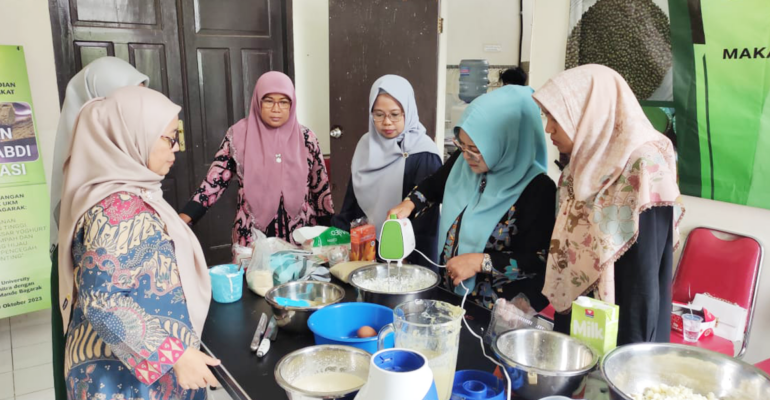IPB University Innovation Service Lecturer Team Gives Training on Steamed Cake Making from Spiced Yoghurt

The IPB University Innovation Service Lecturer Team held another service activity for micro, small and medium enterprises (MSMEs) in Tanjung Pati, Harau District, Lima Puluh Kota Regency, West Sumatra Province.
Prof Sedarnawati Yasni and Dr Tetty Kemala, IPB University lecturers involved, conducted a social service programme through the development of MSME products in the form of steamed cake and yoghurt flavoured with spices and mung beans as stunting prevention.
In its implementation, the team partnered with one of the SMEs assisted by the Department of Trade, Cooperatives and SMEs and the Food and Drug Supervisory Workshop (POM) in Payakumbuh, namely the UKM Mande Bagarak.
“Spice-flavoured yoghurt is a development product of IPB University’s Pulang Kampung Lecturer programme in 2022 at UKM Mande Bagarak. This year, the utilisation is increased by making it one of the basic ingredients for making high protein food in the form of steamed cake,” said Prof Sedarnawati.
According to her, steamed cake is easy to make by the community. This is because most households have steaming equipment. In addition, steamed cake products made from yoghurt flavoured with spices and mung beans can play a role in preventing stunting.
“This step is also our effort to increase the utilisation of local potential, namely cassava and mung beans, as well as the development of the utilisation of yoghurt products as halal food that has health benefits and is liked by the community,” she explained.
Prof Sedarnawati also said that the Innovation Service Lecturer programme indirectly contributes to reducing stunting in children. This is one of the six goals in the 2025 Global Nutrition Target and a key indicator in the second Sustainable Development Goals (SDGs): Zero Hunger.
At the opening ceremony, Kris Susmaji (Secretary to the Head of the Cooperative and MSME Agency), Maghrifa Dwi Maulani, STP (First Expert Food and Pharmacy Supervisor of Balai POM) and Multiviza Muslim (Balai Pembibitasi Hijauan Pakan Ternak Padang Mengatas), and Jamaluddin (Deputy Director I – Politani) were present.
The practice of making steamed cakes was accompanied by Dr Tetty Kemala. She explained that the main ingredients used to make high-protein steamed cakes are liquid milk, yoghurt, mung beans, cassava, margarine, palm sugar or brown sugar, ginger and cinnamon spices, and salt.
Participants made three flavour variations, namely (1) without using palm sugar, (2) without using granulated sugar, and (3) without using milk and margarine. The steamed cake took about an hour to make.
During the discussion, Dr Tetty emphasised the importance of using halal products in the steamed cake making process. “It must be ensured that the ingredients have halal status. This can be seen from the packaging that has a halal logo, or can be checked on the halalmui.org or sihalal website,” she explained.
The Innovation Service Lecturer Team also visited with the Head of Animal Husbandry and Animal Health Division, Food and Agriculture Service Office of Padang Panjang City, West Sumatra to a dairy cattle house and cheese processing factory, namely Lasi Cheese.
On that occasion, the MSMEs present included Haloma MSME (production of pineapple jam and probiotic drink Bionas, has been operating for 1 year), Locavore MSME (production of bread and pudding from purple sweet potato, has been operating for 2 years), MPJ MSME (production of pecel seasoning, dimsum, siomai, potato sticks and catering, has been operating for 3 years), Checilia MSME (production of grilled sagon and Lebaran cookies, has been operating for 11 years) and Guseta MSME (production of gula semut, gula merah, gula cair, gula petak, has been operating for 5 years). (*/Rz) (IAAS/RUM)



